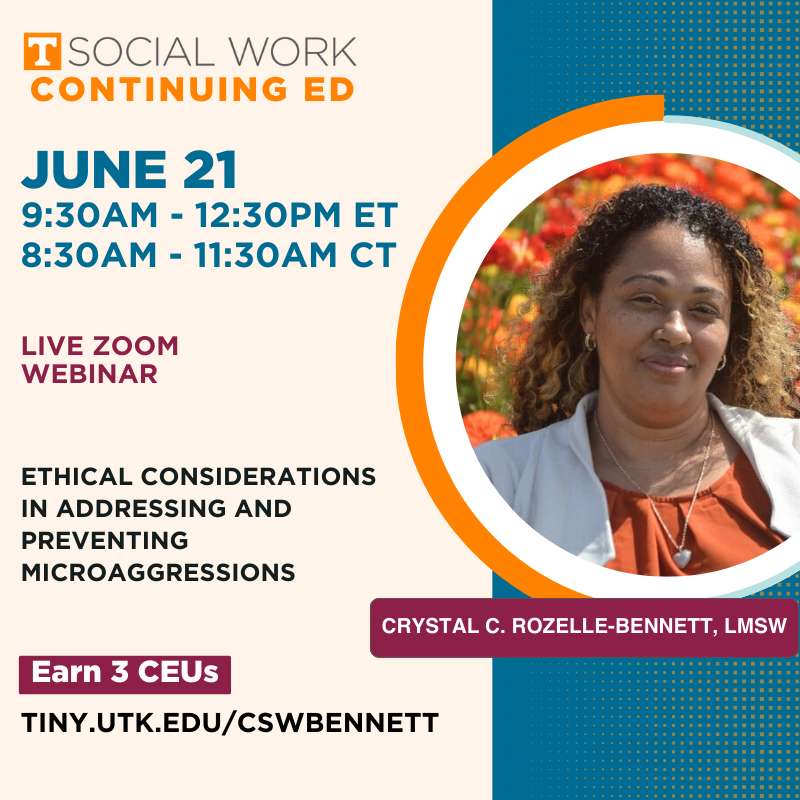
Date: Friday, June 21, 2024
Time: 9:30 a.m. to 12:30 p.m. ET | 8:30 a.m. to 11:30 a.m. CT
Location: Live Zoom Webinar
Presentation Title:
Ethical Considerations in Addressing & Preventing Microaggressions
Presenter: Crystal C. Rozelle-Bennett, LMSW
Cost – $60
Logistics
Zoom information will be emailed to participants the afternoon before and morning of the event. Registration will close two hours before the event start time. This event is live and will not be recorded.
Discounts
To request a discount code, please follow the instructions below. One discount allowed per purchase.
- UTCSW Alumni: 25% – please email your graduation year and the program you completed to cswcep@utk.edu.
- UTCSW Field Instructors: 50% – please send an email using your agency email address to cswcep@utk.edu.
- UTCSW Faculty/Staff: 100% – you may have already received this info; please check your inbox before emailing cswcep@utk.edu to request the code.
- UTCSW Students: 100% – please contact your program staff member for access.
Course Description
Microaggressions are an extremely common experience amongst marginalized and minoritized individuals today; therefore, to practice ethically, it is essential that those in the helping profession obtains the knowledge, skills, and ability to both help children, youth and families navigate such experiences and prevent further harm by avoiding inadvertent microaggressions in the work we do. “The American Psychological Association (2003) stresses the importance of being aware of oneself as a racial and cultural being, as well as being aware of the cultural worldviews of one’s clients” (Williams, Shamp & Harris, 2017). Unfortunately, many professionals may sometimes engage in the reinforcement of stereotypes, discrimination, and perpetration of microaggressions which tend to run contrary to these professional recommendations (Sue et al., 2007).
This interactive workshop will take a deep dive into defining and exploring examples of microaggressions and the impact of microaggressions on individual well-being. Through the use of video clips, discussion and reflective activities, participants will be encouraged to explore their own cultural worldview, engage in the practice of cultural humility, and learn strategies to mitigate the perpetration of microaggressions, toward assisting clients in healing from the daily experience of microaggressions.
Learning Objectives
Upon completion of this course, participants will:
- Define and describe the connection between implicit bias, stereotyping, and microaggressions;
- Identify at least two examples of how microaggressions show up in the helping relationship;
- Explain the impact microaggressions may have on the receiver of such attacks; and
- Describe ways to apply strategies to practice cultural humility and mitigate harm in the helping relationship.
Target Audience
Behavioral Healthcare Providers, Individuals in Helping Professions, Teachers
CEUs
Participants are eligible to earn 3 Ethics CEUs.
A link for the program evaluation will be emailed to participants after the event has concluded. To receive the CEU certificate, participants must complete the evaluation by the deadline indicated in that email. Certificates are not automatically generated and will be emailed out after the deadline to complete the evaluation has passed.
Accessibility
There is space on the event registration form to indicate accommodations required. We work with the university’s Office of Equity & Diversity and Office of Student Disability Services to make arrangements and ask that you allow us adequate time to communicate with them about any services needed.
It is a priority to make our events inclusive and accessible. For any questions or to notify us of a request, please email cswcep@utk.edu at least three business days prior to the event.
Refunds
To request a refund, please email cswcep@utk.edu. Full refunds will be granted up to 48 hours prior to the event. In the event this program is cancelled, full refunds will be issued to all registrants.
About the Presenter

Crystal is an educator, an advocate, a survivor, and a self-proclaimed thriver! For the past 25 years she has been driven by her personal experiences of trauma to elevate and amplify the voices of individuals and communities, to promote healing and opportunities to move from surviving to thriving. Crystal has worked alongside professionals to create trauma informed, culturally inclusive and person-centered spaces. Her work experiences include advocacy within the child welfare system, oversight of child and youth programs, crisis hotline response, delivery of community based mental health services and implementing trauma informed strategies and programs for school districts. Throughout these experiences she has had the opportunity to gain essential knowledge and skills related to individual, community, and collective trauma. She has been called upon to provide training, coaching and consultation across the nation in the subject areas of Human Trafficking, Suicide Prevention, Motivational Interviewing, Community and Collective Care, Child Trauma & Maltreatment and Racial Trauma. Crystal serves as an adjunct at Florida State University and Southwestern College where she teaches courses on Trauma Informed Social Work and Multicultural Counseling, respectively. She is a fierce advocate for social justice and leads courageously to dismantle oppressive systems and create equitable and just services, policies, and programs.
References
Cross, T., Bazron, B., Dennis, K., &Isaacs, M. (1989). Towards a culturally competent system of care (Vol. 1) Washington, DC: Georgetown University
Eliscu, D., Bergmann, U., Davis, K., Fitzgerald, J., Gomez, A., Janis, O., & Cloud, L. (2000). Targeting oppression: Engendering empowerment. EMDRIA Conference Panel Presentation
Hays, P. A. (2022). Addressing Cultural Complexities in Counseling and Clinical Practice: An Intersectional Approach (4th edition).Washington DC: American Psychological Association
Leary, J. D. G., & Robinson, R. (2018). Post traumatic slave syndrome: America’s legacy of enduring injury and healing. Joy DeGruy Publications Inc.
Nickerson, M. I. (2017). Cultural competence and healing culturally-based trauma with Emdr therapy: innovative strategies and protocols. Springer Publishing Company, LLC.
Piepzna-Samarasinha, L. L. (2018). Care work: Dreaming disability justice. Arsenal Pulp Press
Schwartz, A., & Maiberger, B. (2018). Emdr therapy and somatic psychology: interventions to enhance embodiment in trauma treatment. W.W. Norton & Company.
Sue, D. W. & Sue, D. (2013). Counseling the Culturally Diverse: Theory and Practice (sixth edition). Hoboken, NJ: John Wiley & Sons.
Wing Sue, D., & Sue, D. (2022). Counseling the culturally diverse: Theory and practice (9th ed.). John Wiley & Sons, Inc